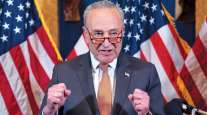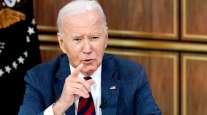Senior Reporter
Infrastructure Funding in Limbo as House, Senate Weigh Options

[Ensure you have all the info you need in these unprecedented times. Subscribe now.]
The leadership for Senate Republicans and House Democrats announced differing legislative strategies during an economic and health crisis that has prompted several transportation stakeholders to urge emergency assistance.
The Senate’s Republican leader, Mitch McConnell of Kentucky, has not scheduled the chamber’s consideration of the next phase of coronavirus relief after referring to a House-passed $3 trillion relief package as a “liberal wish list.”
McConnell insists the Senate is tackling “serious work” as he stopped short of detailing a path forward for providing emergency funds to the freight and passenger transportation system. The $3 trillion House measure included $15 billion for transportation agencies and about $15.7 billion for transit systems.
While members of his caucus push for a comprehensive stimulus measure that could include funding for infrastructure projects, McConnell has emphasized the chamber already is tackling concerns related to the pandemic, the economy, foreign policy and health care.
“Over here in the United States Senate, the lights are on, the doors are open, and we are working for the American people. All month, we’ve been in session — passing national security legislation, confirming key nominees, and holding hearings on the coronavirus crisis and the effectiveness of the historic rescue package the Senate wrote and passed,” said McConnell on May 20. “Every day, the Senate’s work is paying dividends to working families across the country.”
Days earlier he claimed, “Serious work here in the Senate, and partisan pointlessness in the House.”
House leaders pointed to the likelihood of unveiling a massive infrastructure funding package in the coming weeks.

Pelosi
Speaker Nancy Pelosi (D-Calif.) raised the prospects of an infrastructure measure, telling reporters on May 20 such a bill “will be coming soon.” Lawmakers central to infrastructure policy have been working on a surface transportation measure.
At the start of the year, Pelosi’s caucus had unveiled a five-year, $760 billion infrastructure policy blueprint that proposed $329 billion for highway programs. It also outlined $105 billion for transit systems, $86 billion for investments in broadband, $60.5 billion for wastewater and other water infrastructure programs, and $55 billion for rail networks.
Missing from the Democrats’ infrastructure plan was a long-term source of funding for highway projects.
During the pandemic, Congress has sent President Donald Trump about $3 trillion in emergency aid to address concerns in the medical sector, small and large businesses, and transportation networks.
In late March, Trump encouraged lawmakers to proceed with a $2 trillion infrastructure package that would be linked to an economic response. He explained the funding would be borrowed at low interest rates. The president has not recently advocated for an infrastructure measure, although he championed a deregulatory campaign for big-ticket projects. He’s argued removing certain environmental regulatory requirements would facilitate a project’s completion.
“I’m just saying, over the years, there have been roads that have gone through a process for many years — roads and highways. So we’re going to be getting it down to a year,” Trump said May 19. “And maybe it’s not going to get passed for environmental reasons or safety reasons, but we’re going to know quickly.”
Transportation stakeholders representing state agencies, unions, airlines, toll collectors, transit systems and the freight sector have sought federal aid during the pandemic. The American Association of State Highway and Transportation Officials, for instance, had called on Congress to dedicate $50 billion for transportation agencies.
“We’re really looking forward to working with leaders in the House and in the Senate to try to make sure that whatever goes to the president’s desk here in the next few weeks includes a higher number than the $15 billion that’s in the House bill right now,” AASHTO Executive Director Jim Tymon said May 18.

Spear
“ ‘We’re all in this together,’ is a common refrain heard as we confront one of history’s greatest challenges. Truckers have helped carry America through this crisis, and we’ll continue to lead as our country emerges out of it,” noted Chris Spear, American Trucking Associations president, on May 8. To generate revenue for transportation programs, ATA proposed the adoption of a fund that would rely on a 20-cents-per-gallon fee on motor fuels collected at the wholesale rack.
“When it comes to funding the roads and bridges that Americans use every day, the trucking industry more than carries its weight — and we’re proud of the fact. While trucks account for only 4% of vehicles on our nation’s roads, we pay nearly half of all Highway Trust Fund user fees. And we’re willing to pay more to get this job done,” Spear added.
The Highway Trust Fund supports programs around the country via dwindling revenue from the federal fuel tax. The 18.4 cents-per-gallon gas tax and 24.4 cents-per-gallon diesel tax was set in 1993.
Want more news? Listen to today's daily briefing:




